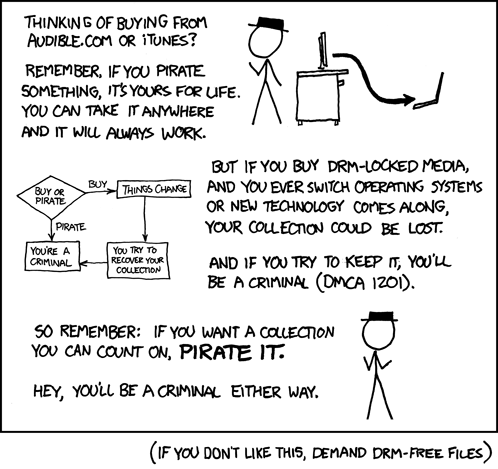| Cartoon - Digital Rights or Wrongs? |
| Written by Stone Tapes | |||
| Sunday, 15 July 2012 | |||
|
Digtal Rights Management might seem to be attractive. After all, it stops people stealing your work. But there is a downside and we need to weight the pros and cons.
This week's carefully selected xkcd cartoon is all about the frustrations of DRM. If you are a programmer then you might well want to use DRM to protect your work and stop people stealing your creation, but you need to remember that use it also makes your work less valuable to the end user.
It is a simple emotional response to want to stop people stealing your work. If you have written a great program, book, music, or whatever you will feel pain when you see or suspect people are stealing it. This much is only reasonable, but before you move to stop them you need to think hard about the logic. Adding DRM to any digital work makes it less valuable to the customer. The simple reason is that DRM fails. Sooner or later the user will do something that causes the DRM protected property to stop working. They will move to another machine, forget their security details or you will shut down your security servers - it happens. What this means is that, from experience, any customer learns very quickly that with DRM comes a short owership experience. In the book world, a paper copy is nearly forever but an ebook with DRM is only for as long as the DRM works. In the music world, a CD is fairly indestructable but a download with DRM is perceived as fragile. For a program, open source really is for as long as you want it, but an app with DRM can be revoked at any time. You don't own anything with DRM, you are simply being permitted to use it for a while. In the user's view DRM is a limitiation that should be reflected in an overall lower price, but we all know that this is rarely the case. As a result, users don't see a DRM-protected digital product as good value. In most cases you will also find that adding DRM doesn't really help convert pirates into legal paying users. Most pirated copies don't equal lost sales. The exception to this rule is the case of industrial scale piracy, where clones are sold to the end user. In this case DRM is mostly just an additional nuisance. Dealing with organized piracy is a different problem to stopping end users making copies. Finally there is the fact that you have to pay for advertising, and what better advertising could you have than happy users giving their friends copies of your excellent app? It is a hard thing to watch your creation being handed around for free, but try to think of the way that you price your creation as including a margin for the end user to make a few copies. The time and effort you save on implementing and mantaining the DRM could be better used in creating a better app. Of course, if someone could invent a 100% foolproof, rock solid form of DRM that protected the users right to own somethng they bought, then perhaps the objections would fade away. Related Articles
Comments
or email your comment to: comments@i-programmer.info
To be informed about new articles on I Programmer, install the I Programmer Toolbar, subscribe to the RSS feed, follow us on, Twitter, Facebook, Google+ or Linkedin, or sign up for our weekly newsletter.
|
|||
| Last Updated ( Sunday, 15 July 2012 ) |


